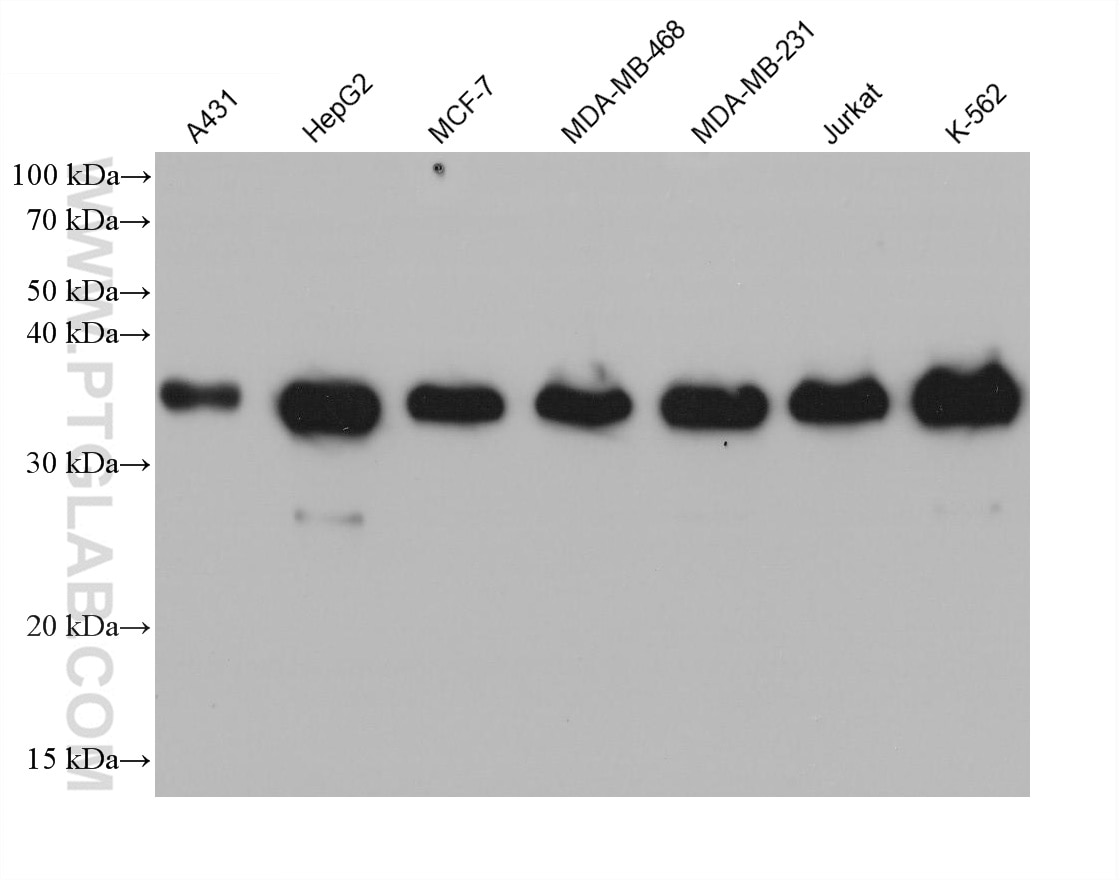MAD2L1BP Monoklonaler Antikörper
MAD2L1BP Monoklonal Antikörper für WB, ELISA
Wirt / Isotyp
Maus / IgG2a
Getestete Reaktivität
human
Anwendung
WB, ELISA
Konjugation
Unkonjugiert
CloneNo.
2H3H1
Kat-Nr. : 68336-1-Ig
Synonyme
Geprüfte Anwendungen
| Erfolgreiche Detektion in WB | A431-Zellen, HepG2-Zellen, Jurkat-Zellen, K-562-Zellen, MCF-7-Zellen, MDA-MB-231-Zellen, MDA-MB-468-Zellen |
Empfohlene Verdünnung
| Anwendung | Verdünnung |
|---|---|
| Western Blot (WB) | WB : 1:5000-1:50000 |
| It is recommended that this reagent should be titrated in each testing system to obtain optimal results. | |
| Sample-dependent, check data in validation data gallery | |
Produktinformation
68336-1-Ig bindet in WB, ELISA MAD2L1BP und zeigt Reaktivität mit human
| Getestete Reaktivität | human |
| Wirt / Isotyp | Maus / IgG2a |
| Klonalität | Monoklonal |
| Typ | Antikörper |
| Immunogen | MAD2L1BP fusion protein Ag7653 |
| Vollständiger Name | MAD2L1 binding protein |
| Berechnetes Molekulargewicht | 34 kDa |
| Beobachtetes Molekulargewicht | 34 kDa |
| GenBank-Zugangsnummer | BC002904 |
| Gene symbol | MAD2L1BP |
| Gene ID (NCBI) | 9587 |
| Konjugation | Unkonjugiert |
| Form | Liquid |
| Reinigungsmethode | Protein-A-Reinigung |
| Lagerungspuffer | PBS with 0.02% sodium azide and 50% glycerol |
| Lagerungsbedingungen | Bei -20°C lagern. Nach dem Versand ein Jahr lang stabil Aliquotieren ist bei -20oC Lagerung nicht notwendig. 20ul Größen enthalten 0,1% BSA. |
Hintergrundinformationen
MAD2L1BP, also named as CMT2 and KIAA0110, belongs to the MAD2L1BP family. It may function to silence the spindle checkpoint and allow mitosis to proceed through anaphase by binding MAD2L1 after it has become dissociated from the MAD2L1-CDC20 complex. MAD2L1BP interacts with the spindle checkpoint and coordinates cell cycle events in late mitosis. MAD2L1BP may play an active role to remove MAD2 from p55CDC and tether MAD2 for silencing the checkpoint.
Protokolle
| PRODUKTSPEZIFISCHE PROTOKOLLE | |
|---|---|
| WB protocol for MAD2L1BP antibody 68336-1-Ig | Protokoll herunterladen |
| STANDARD-PROTOKOLLE | |
|---|---|
| Klicken Sie hier, um unsere Standardprotokolle anzuzeigen |


